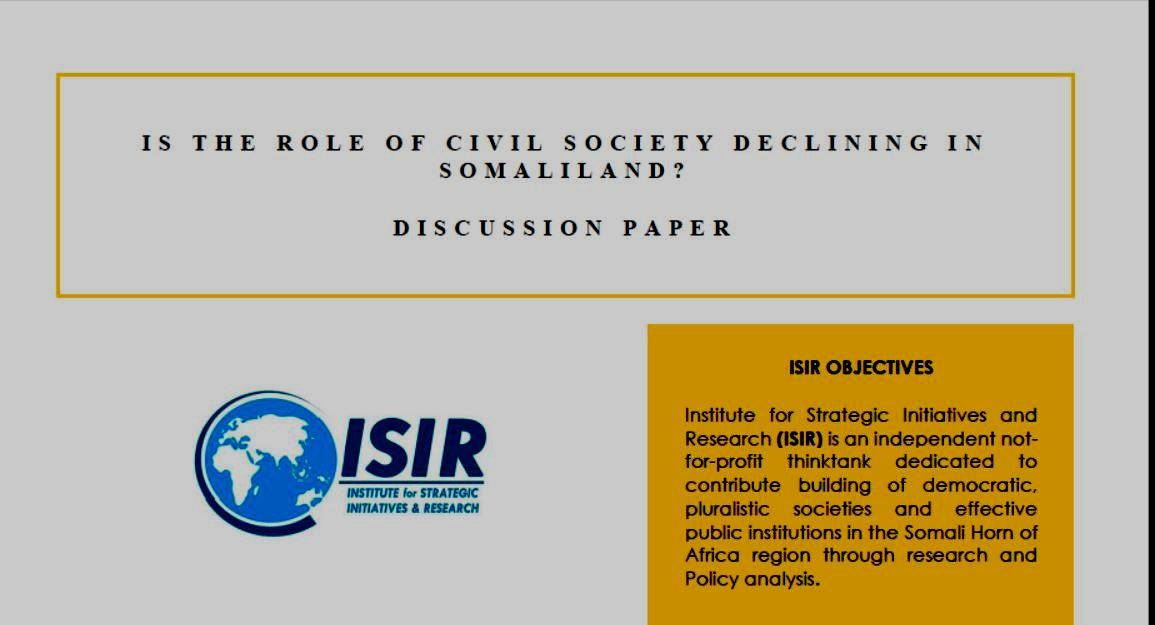
In this discussion paper, ISIR examines the current civil society prominence and their declining objective role in Somaliland and will pose the question as to why civil society has not progressed to the level they should have been.

Introduction
The idea of civil society movements in the Somali territories and in particularly Somaliland goes back to the colonial time when clubs for public orientation, education, and even independence movements were formed to resist the colonial administrations. However, it was formalized after the independence and particularly during the nine years of Somalia civilian administrations between 1960-69. Civil society at the time had existed in the form of professional associations1. Nevertheless, it was short-lived as the military junta took over Somalia in 1969 and imposed a total deprivation of civil liberty movements.
The situation remained unchanged during the two decades of the military rule until Siyad Barre was ousted in 1991. The first civil society groups started to re-emerge and gradually became the only reliable institutions after the collapse of the central government, and later flourished. At that time, the situation was chaotic and large numbers of returnees had been coming back from refugee camps with empty hands to empty destinations. The newly formed civil society organizations mainly NGOs were engaged in relief and recovery efforts to respond to the needs of returning civilians as well as public mobilizations through volunteerism.
Later, when the aid agencies in Somaliland increased, quite a significant number of local non-governmental organizations were formed. The momentum extended to bring forces together and build consortiums of youth, women, people with disability and minority groups among others. After 2002, the civil society extended their role from aid services to advocates for democratization, good governance, rule of law including access to justice, and have participated in the national policy dialogue processes. For instance, civil society made progress in their advocacy efforts for youth and women inclusion in government leadership.

Comparing to many countries including neighboring states, Somaliland was praised in the past for introducing relatively growing democratic attributes including active participation of vibrant civil society groups and freedom of expression, but more recently, there are skeptical questions related to the new direction of the civil society and its movements.
This discussion paper examines the current civil society prominence and their declining objective role in Somaliland and will pose the question as to why civil society has not progressed to the level they should have been, with some arguing the trend is going downward thus the missing voice of the third sector created space for the return of clan narratives to the benefit of partisan politics hence widening internal division among citizens. This comes at a critical time where civil society’s role is imperative to the democratization of Somaliland.
more recommended stories
 Somaliland to Defend Sovereignty Against Somalia’s Provocative Laascaanood Visit
Somaliland to Defend Sovereignty Against Somalia’s Provocative Laascaanood VisitThe Ministry of Foreign Affairs and.
 New Director Appointed: Burao Hospital’s Fall and the Fight for Revival
New Director Appointed: Burao Hospital’s Fall and the Fight for RevivalBurao Hospital begins a new chapter.
 Somaliland: While Mogadishu Burns, Somalia Seeks Chaos in Sool
Somaliland: While Mogadishu Burns, Somalia Seeks Chaos in SoolHargeisa, April 9, 2025 – (Somaliland.com).
 Somaliland Presidency Delivers 10 Vital Dialysis Machines to Hargeisa Group Hospital
Somaliland Presidency Delivers 10 Vital Dialysis Machines to Hargeisa Group HospitalHargeisa – Somaliland – The President.


Leave a Comment